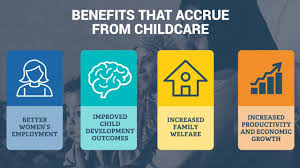The Importance of Affordable Childcare and Early Childhood Education

The Importance of Affordable Childcare and Early Childhood Education
Introduction
Affordable childcare and early childhood education are critical components of a thriving society. They lay the foundation for a child’s development and future success while enabling parents to participate in the workforce and contribute to the economy. Despite their importance, many families face significant barriers to accessing quality and affordable childcare and early education services. Addressing these challenges requires comprehensive policies and community support to ensure that every child has the opportunity to reach their full potential.
The Benefits of Early Childhood Education
Early childhood education (ECE) encompasses the care and learning that children receive from birth to age eight. Research has consistently shown that high-quality ECE has numerous benefits:
- Cognitive Development: Early childhood education helps develop critical cognitive skills such as language, literacy, and numeracy. These skills form the basis for future learning and academic success.
- Social and Emotional Growth: ECE programs provide children with opportunities to interact with peers and develop social skills, emotional regulation, and empathy. These skills are essential for building healthy relationships and navigating social environments.
- Long-Term Academic Success: Children who attend quality ECE programs are more likely to perform better in school, graduate from high school, and pursue higher education. They also exhibit higher levels of self-esteem and motivation.
- Economic Benefits: Investing in early childhood education yields significant economic returns. Studies show that every dollar invested in ECE generates a return of up to $13 through reduced costs in remedial education, social services, and the criminal justice system.
The Challenges of Affordable Childcare
Despite the clear benefits, many families struggle to access affordable childcare and early education. Key challenges include:
- High Costs: Childcare is one of the most significant expenses for families, often surpassing the cost of housing, transportation, and even college tuition. The high costs can force parents, particularly mothers, to leave the workforce or reduce their hours, impacting their financial stability and career advancement.
- Limited Availability: There is a shortage of quality childcare providers, especially in rural and low-income areas. Long waiting lists and limited availability of spots in high-quality programs further exacerbate the problem.
- Quality Concerns: Not all childcare and early education programs provide the same level of quality. Ensuring that programs meet high standards for safety, curriculum, and staff qualifications is crucial for maximizing the benefits of ECE.
- Workforce Challenges: The childcare workforce is often underpaid and undervalued, leading to high turnover rates and a shortage of qualified educators. Improving wages, benefits, and professional development opportunities is essential for attracting and retaining skilled childcare providers.
Policy Solutions and Community Support
Addressing the challenges of affordable childcare and early childhood education requires a multi-faceted approach:
- Increased Funding: Governments at all levels should increase funding for childcare subsidies, grants, and early education programs. This can help reduce the financial burden on families and expand access to quality services.
- Universal Pre-K Programs: Implementing universal pre-kindergarten programs can ensure that all children have access to early education, regardless of their family’s income or background. These programs can be funded through a combination of federal, state, and local resources.
- Support for Childcare Providers: Investing in the childcare workforce is crucial for improving the quality and availability of services. This includes raising wages, providing benefits, and offering professional development and training opportunities.
- Public-Private Partnerships: Encouraging partnerships between governments, businesses, and non-profit organizations can help create innovative solutions to childcare challenges. For example, employers can offer on-site childcare or childcare benefits to support their employees.
- Community Initiatives: Local communities can play a vital role in supporting affordable childcare and early education. Initiatives such as community-based childcare cooperatives, volunteer programs, and parent education workshops can provide valuable resources and support for families.
Conclusion
Affordable childcare and early childhood education are essential for the well-being of children, families, and society as a whole. By investing in these services, we can ensure that every child has the opportunity to thrive and reach their full potential. Comprehensive policies, increased funding, and community support are key to addressing the challenges and making high-quality childcare and early education accessible to all. Together, we can build a stronger, more equitable future for the next generation.
Our social media presence:-
https://www.youtube.com/padindia
https://www.linkedin.com/company/padindia
https://www.facebook.com/Padvoice/